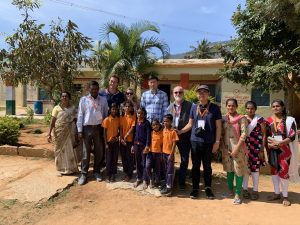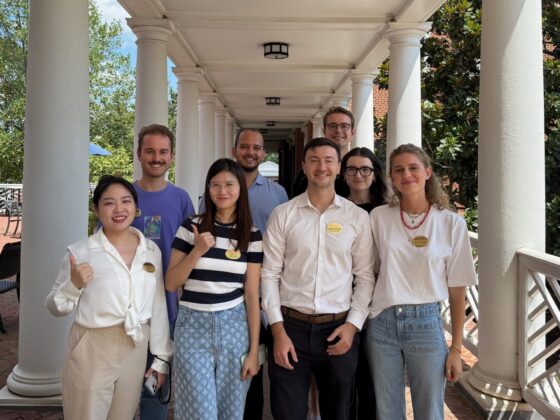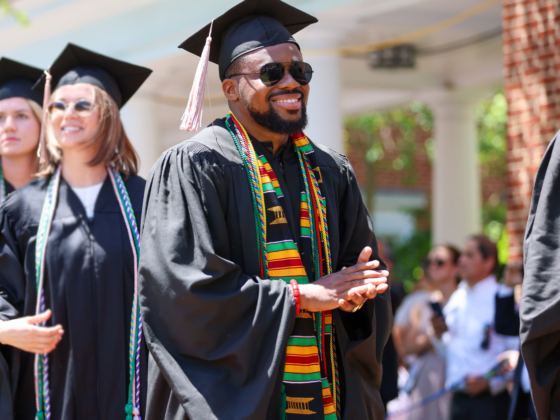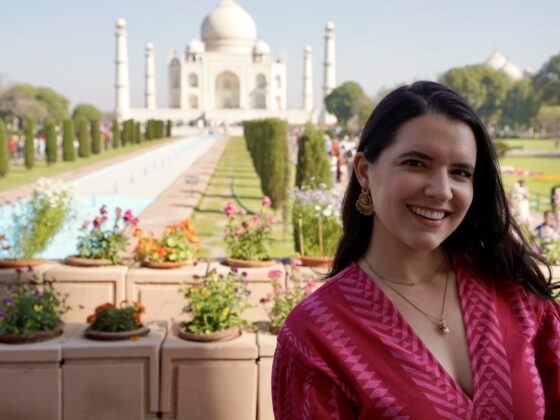Before his upcoming graduation from Darden this spring, Second Year student Chawit Rochanakit (Class of 2020) took some time to share with us his Darden experiences as an international student, his role as the VP for International Affairs, and his decision to participate in the Darden Worldwide Course to India. Chawit writes:
Tell us about your background. What led you to attend Darden?
I am a native of Bangkok, Thailand, born and raised. Before Darden, I spent four years with The Nielsen Company in Bangkok and Ho Chi Minh City, Vietnam conducting marketing research and advising global consumer packaged goods (CPG) producers and retailers. During that time, I found that I loved solving business problems and making connections with my clients and people with whom I worked. I wanted to branch out to see what industries beyond CPG piqued my interest, and I felt that pursuing an MBA at Darden, known for its general management approach, was a natural next step for me.
As an international student from Thailand, what was your transition process moving to a different country to study?
The transition process included two distinct aspects – physically moving to the U.S. and adjusting to my new life in Charlottesville. The moving itself was easy. I remember fun tidbits about new things I discovered in the early days, such as needing to buy a floor lamp on the first day (or face living in the dark since there was no overhead light fixture in my apartment) and feeling so grateful for the in-sink waste disposal unit!
Looking back, I also found my adjustment period interesting. Living in a college town is completely opposite of my life back in Thailand – a stark example being my five-minute walk to the classroom building compared to a two hour commute in Bangkok traffic. I found the change delightful from the outset, and I called Charlottesville ‘home’ within the first week of living here. However, when it came to getting to know the amazing people at Darden, I realized that culture shock was real and I felt a little uneasy at first. I can talk for days about life anecdotes and all the uneasy feelings that I fondly recall; but, since I use English as a second language, it took some time for me to feel that I could express myself fully. Once, I was trying to make a point during a case method class, and I was not economical enough in using my words. I took a little too much of the airtime, but afterward, my Section C friends let me know that they found my comments honest and insightful. That day I felt so encouraged, and I am sure every student at Darden has a similar version of that story.
Do you have any advice for future international students considering studying at Darden?
I would recommend chatting with current students and alumni to see whether Darden would be a good fit for you. These people are the best source of insights into life as a Darden student!
Darden can be quite intense, but it is also extremely rewarding. One thing I have learned is, in life, you can never be prepared enough, so come to Darden ready to dive in with an open mind, willing to try new things and to share ‘your world’ with your peers. Sometimes spontaneity, which happens often here, provides powerful learning moments.
Why did you choose to participate in the Darden Worldwide Course (DWC) to India? What were your key takeaways from the DWC?

The topic ‘Addressing Tough Problems in Business and Society’ piqued my interest, and the fact that I had never been to India provided a perfect reason to choose the course. I had a great time immersing myself in a new culture, learning from amazing people who do their part to make a change, and having fun alongside my classmates. I especially appreciated the chance to visit the home and meet the family of one of my section mates from India (the dinner that night was the best, hands down!)
My biggest takeaways from the course relate to the mindset of changemakers and the mentality that turns adversity into opportunity. I learned so much from a renowned cardiac surgeon whose highly effective and affordable innovation in surgery techniques has changed the lives of countless Indian and international patients. Hearing from our tour guide who showed us Dharavi, Mumbai’s largest slum, greatly humbled me. He told me that he was 17 when, for the first time, he realized there is a whole world outside Dharavi! As we toured the place in which he was born and raised, he shared with us his plan to start his own business. His story made me contemplate life’s opportunities and how one can develop their potential despite hardship.
How did you get involved with Darden Student Association (DSA) and decide to run for the DSA VP for International Affairs?
Towards the end of my first year, I realized how much I learned and grew in less than a year at Darden. I wanted to give back to the school and I thought that my experience as an international student could be helpful for my peers and the following classes, so I decided to run for the position. I am so grateful for the support of my classmates and the First Year students!
Tell us about your role in DSA as the VP for International Affairs. What did you enjoy most about this role?
The main responsibility of the VP for International Affairs is to serve as the voice of international students at Darden by bringing forward the ideas for better integration of the student body and by addressing challenges that international students may face as they acclimate to life at Darden. I worked closely with both the Darden administration and fellow DSA board members to ensure that international perspectives are considered.
The privilege of this role is that I get to know and learn from so many Darden peers on a personal level. I thoroughly enjoyed working with First Year student leaders and helping them find their leadership voices. It brings me great joy doing my small part to help ambitious international students thrive at Darden, to get a summer internship that they want, or simply to feel more at home at Darden!
What are your hopes for DSA?
One aspect of Darden that I particularly appreciate is how much the school encourages student leadership. As students, we have the opportunity and power to shape the experience that we wish to have. All student leadership positions are now within the Class of 2021, and I am impressed by the leadership and commitment that rising Second Years have already shown from the start.

Though student leadership changes each year, the mission of DSA ‘to create an MBA experience where every student feels valued and included’ does not. The sense of community matters not only because it makes everyone feel good, but also because it cultivates a learning environment that all of us can benefit from during the brief but valuable two years together. Darden’s sense of community is what attracts almost all of us to commit to the School, and I hope that its commitment to creating a tight-knit, global community remains strong. Throughout my time here, I have learned that representation is important and a good starting point, but it takes intentionality, empathy, and listening to build and maintain a meaningful community.





